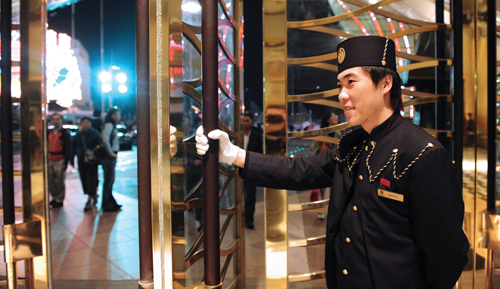Macau’s lingering manpower shortfall is affecting travel agencies more than hotels. Prudence Lui inspects

A surge in Macau’s hotel supply is heightening the demand for skilled demand, compounding a labour crunch issue that has afflicted the industry for ages.
According to Macau’s Land, Public Works and Transport Bureau, a total of 17 hotels under construction in 1Q2016 would bring online some 10,774 rooms while 34 other hotels in the construction planning phase are expected to supply a further 8,884 rooms.
Most recently, the debut of luxury integrated resorts like The Wynn Palace in August and The Parisian Macao this month have added over 4,700 keys.
However, Macau’s manpower shortage has played out unevenly on the sector, with hotels generally faring better than travel agencies, according to industry players interviewed by TTG Asia.
“In this poor economic condition, hotels do not need to compete directly with other industries for staff as people find hotel pay more attractive,” said Patrick Lo, Institute for Tourism Studies, Macao, lecturer and member of IFT Tourism Research Centre.
He further added that some unsuccessful entrepreneurs in the F&B industry have been reabsorbed into the hospitality sector, lured by better renumeration packages in hotels.
The brunt of the industry’s manpower crunch hence falls disproportionately on SMEs, noted Bruno Simões, CEO of Smallworld Experience.
“Of course agents and SMEs are suffering with the opening of new properties. Labour is very scarce and expensive. Large properties pay better, have more appealing fringe benefits, and offer better career and promotion prospects.”
China Travel Service (Macao), travel department sales and marketing manager, Pun Cheng Man, agreed: “For sure, hotels are better off (while) we agents face severe manpower problems owing to long and irregular working hours. Moreover, our pay can’t compare to generous hotel pay.”
Eric Tam, Macau general manager at Westminster Travel, has a different view. While acknowledging that “new graduates are easily lured by the hotel industry given their better working environment and perks”, he opined that agencies are not entirely in competition with them “as the nature of hotel and travel agent (jobs) are different”.
He added: “Travel agencies owned by casino junket operators have either downsized or closed due to (the sharp decline in) Chinese visitors. This has generated some manpower supply (for other agencies).”
Amid such tepid climate, travel agency bosses have undertaken measures to surmount labour market challenges.
“To retain talent, we maintain good team morale and stress close communication with staff. Our team in Macau is small but the most effective way is to incentivise them,” Tam said.
He continued: “In the long run, I hope to see more internship opportunities for students and widen their perspectives by putting them in various job positions in travel industry.”
Smallworld’s Simões shared: “To compete with (bigger employers), we offer benefits that the young generation appreciates – flexibility with holidays and working schedule, informal atmosphere, empowerment and independence in their projects.
“We minimise the impact (of labour shortage) by opening an office in Zhuhai to support Macau operations. Like many other companies in Macau, we also expanded operations to other markets such as Hong Kong, China and Vietnam.
Urging a liberalisation of the work force in Macau, he remarked: “Protectionism is an old-fashioned policy. Singapore is a good example. It’s a country that welcomes talent in a competent and swift way.”
This article was first published in TTG Asia September 2016 issue. To read more, please view our digital edition or click here to subscribe.




















